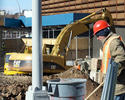At the end of most US presidential elections, most Americans are ready to see the last of campaign ads, social media commentaries and tension-fraught news coverage. That’s even more true this year. But more than in most recent elections, we shouldn’t expect the frustrations and divisions that have surfaced over the past 18 months to disappear after the ballots have been counted. Tensions over class and race, especially, may die down, but they aren’t going away. If a new president will take them on, something good might yet emerge from this ugly election. read more »
Obama's America
Memo to the Next President: Don’t Forget the Working Class
- Login to post comments
Richard Florida's Federal Fantasy
Urbanist Richard Florida, in a New York Daily News op-ed, has called for President Obama to define his legacy not only by focusing on gun control, immigration and climate change, but by zeroing in on an even more important issue: America’s urbanization. read more »
The Suburbs Could Save President Obama From Defeat
President Obama’s disdain for suburban America has been well-documented. Yet, ironically, the current revival in housing, largely in those same suburbs, might be the one thing that could rescue his floundering campaign. Unlike the Democrat-dominated central cities and the rock-red Republican countryside, the suburbs remain the country’s primary contestable territory. read more »
Declining Birthrates, Expanded Bureaucracy: Is U.S. Going European?
To President Barack Obama and many other Democrats, Europe continues to exercise something of a fatal attraction. The “European dream” embraced by these politicians — as well as by many pundits, academics and policy analysts — usually consists of an America governed by an expanded bureaucracy, connected by high-speed trains and following a tough green energy policy.
One hopes that the current crisis gripping the E.U. will give even the most devoted Europhiles pause about the wisdom of such mimicry. Yet the deadliest European disease the U.S. must avoid is that of persistent demographic decline. read more »
Whatever Happened to 'The Vision Thing'? Part II
More than two years ago (March 2009, to be precise), New Geography published an article I wrote, entitled Whatever Happened to ‘The Vision Thing'?. It began:
When I was in elementary school, I remember reading about the remarkable transformations that the future would bring: Flying cars, manned colonies on the moon, humanoid robotic servants. Almost half a century later, none of these promises of the future – and many, many more – have come to pass. Yet, in many respects, these visions from the future served their purpose in allowing us to imagine a world far more wondrous than the one we were in at the time, to aspire to something greater. read more »
Millennials Have the Answer to the Country’s Fear, Uncertainty and Doubt
America is about to enter a presidential campaign that promises to be filled with divisive rhetoric and sharp differences over which direction the nominees want to take the country. This will be the fourth time in American history that the country has been sharply divided over the question of what the size and scope of government should be. Each time the issue was propelled by vast differences in beliefs between generations that caused the country to experience long periods of Fear, Uncertainty and Doubt (FUD), before ultimately resolving the issue in accord with the ideas and beliefs of a new generation. read more »
- Login to post comments
The 2012 Vote: A Newly Diverse Center
Demographic transformations are changing how the American people vote. In 2010, only 15 per cent of Americans claimed to be completely unaffiliated independent voters, while 48 per cent identified with the Democratic Party and 37 per cent with the Republican Party. Back in the 1990s, party identification was at 44 per cent each. read more »
Tests, Lies and The Race to the Top
Obama had his “Sputnik Moment,“ when standardized test scores around the world pointed to the mediocrity of American students in reading, math and sciences. There is now a major mantra coming from Washington to all state capitals: the “race to the top” is on, and it doesn't include a continuation of the downward spiral of test scores. The new modus operandi: Leave aside achievement throughout the years in high school, the stream of G.P.As., the difficulty of courses taken during the years in 9 to 12, and any creative projects done by students. read more »
Census 2010: A Texas Perspective
If you want to get a glimpse of the future of the U.S., check out Fort Worth, TX. Never mind the cowboy boots, but you might want to practice your Spanish.
Texas is growing explosively and much of that growth is among Latinos. The latest Census Bureau figures show the Lone Star State grew by 20%, to over 25 million people, recording about a quarter of the nation’s overall growth. read more »
The Millennial Mosaic
Esperanza Spalding, winner of the best new artist award at this year’s Grammys, personifies the ethnic trends reshaping America. She is a fresh-faced 27-year old jazz bassist whose very name portrays her mixed ethnic and racial heritage as the daughter of an African-American father and a Hispanic, Welsh, Native American mother. Spalding first gained her deep interest in music watching French-born Chinese American classical cellist Yo Yo Ma on “Sesame Street,” a TV program that has perhaps contributed to ethnic acculturation in the U.S. as much as any other institution. read more »






















